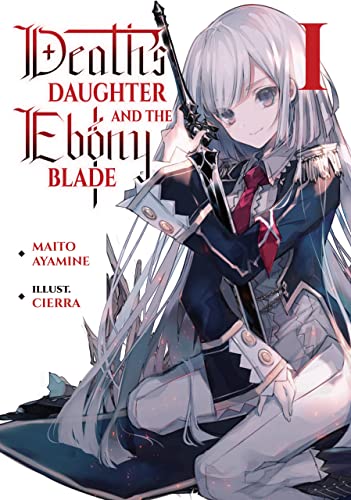By Maito Ayamine and Cierra. Released in Japan as “Shinigami ni Sodaterareta Shoujo wa Shikkoku no Tsurugi wo Mune ni Idaku” by Overlap Bunko. Released in North America by J-Novel Club. Translated by Sylvia Gallagher.
It’s probably time to bring up Michael Moorcock and the series Elric of Melnibone, a series that I’m 100% sure that Maito Ayamine has read over and over again. This particular light novel series happens to feature a silver-haired protagonist who wields a sword that supposedly takes the souls of those it kills and gives them to their patron. Which, well, is exactly what happens in Elric as well. That said, Death’s Daughter and the Ebony Blade does not remotely have a sense of tragedy or pathos in it, running instead on “gosh, that murderous military scamp, isn’t she adorable?”. In the Elric series, you can be reasonably certain that everyone around Elric, particularly his love interests or close friends, will die. Olivia has Ashton has her not-quite-love interest, and Claudia as her “in my heart, this is an OTP” best friend/morality chain, but I have little worry that they’ll be killed off anytime soon. The same can’t be said for anyone else on the side of the Empire.
After the events of the first book, Olivia has gotten a bit of a reputation. In fact, she’s being called a monster, something she is not happy with. (Later she gets upgraded to “God of Death”, which pleases her much more). The book rapidly becomes a series of battles where the moral of the story is “if Olivia is here, or able to get here in the nick of time, we will win. Otherwise, bad things will happen.” The Empire tries sending some of its strongest warriors to fight her, and then a few of its generals. The outcome is the same. It helps that she has Ashton’s tactics, of course, which are also rapidly being appreciated more and more, by her allies if not by the Empire. Can someone come along that causes Olivia to reflect on what she has become? Or is it just “I want to eat delicious cake and butcher enemies, and this town has no cake?”.
In case it was not crystal clear, you should only be reading this series if you have no trouble with a moral void of a main character. In any other series, Olivia would be the terrifying villain. Indeed, I was sort of expecting Claudia to turn to Ashton at some point, possibly after Olivia had decided on the blood and skulls-themed family name as the one she’ll take going forward, and say “Are we the baddies?”. No, you’re not, but that’s really only because there are no goodies in this book, really. Everything can be abandoned in the name of military victory. There is some lip service paid to what it means to be a good lord of a city, in terms of protecting the people who live in that city from harm, but even there the lesson is taught by the execution of the errant lord.
Essentially, this is a very dark series, but it’s not written in a dark manner. It’s written as if this is Haruhi Suzumiya with a sword. That sort of dissonance is probably what makes it interesting.

